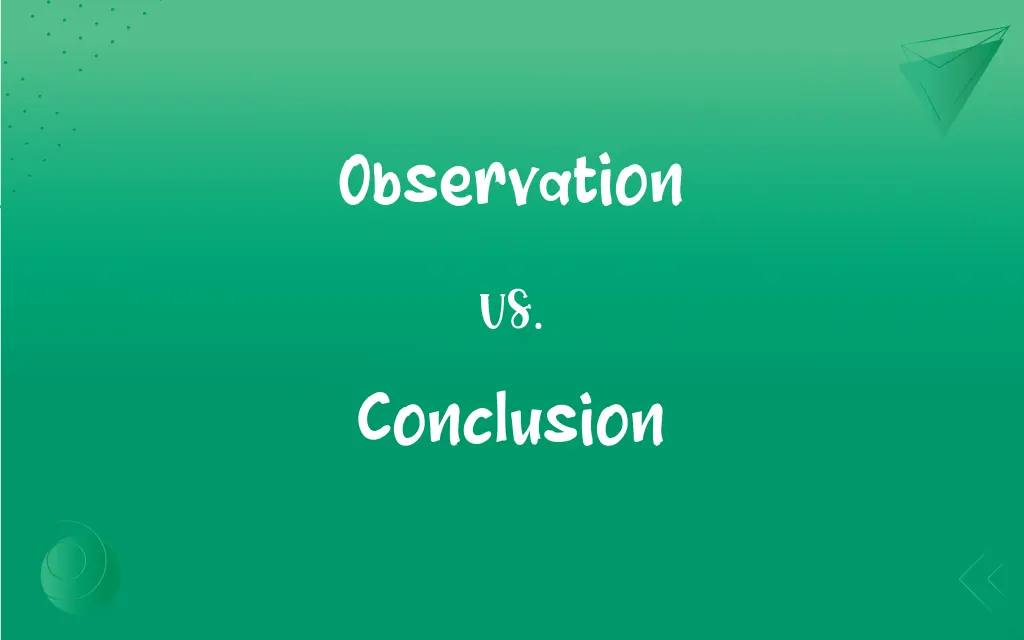Observation vs. Conclusion: What's the Difference?
Edited by Aimie Carlson || By Janet White || Published on March 20, 2024
Observation is the act of noticing or perceiving something, while a conclusion is a judgment or decision reached after considering observations and evidence.

Key Differences
Observation refers to the act of noticing or perceiving something directly through the senses. It's an objective process of gathering information from the environment. Conclusion, on the other hand, is the process of forming a judgment or decision based on the observations and available evidence. It involves subjective reasoning and interpretation of the observed facts.
In the context of scientific methodology, observation is the initial step where data or facts are collected through experiments, surveys, or other means. It is empirical and relies on sensory experience. Conclusion, in this context, is the final step where the data collected through observations are analyzed, and a hypothesis is either supported or refuted. It is the inference drawn from the data.
Observation is a key component in critical thinking and problem-solving. It involves noticing details, patterns, or changes without bias. Conclusion, in these contexts, is the result of processing these observations through logical reasoning or analysis, leading to a final decision or opinion.
Observation can also refer to a remark, statement, or comment based on something one has seen, heard, or noticed. It's often used in everyday language to describe a simple noting of a fact or occurrence. Conclusion, in everyday usage, can refer to the end or finish of an event, process, or text, indicating a final part or summary.
In a research setting, observation is a methodical, planned, and systematic process to collect data about a subject. Conclusions in research are carefully drawn interpretations and generalizations based on the observed data, often leading to new hypotheses or theories.
ADVERTISEMENT
Comparison Chart
Nature
Empirical, direct
Interpretative, indirect
Reliance
On senses or instruments
On reasoning and logic
Role in Research
Data gathering
Data interpretation
Subjectivity/Objectivity
Generally objective
Often subjective
Outcome
Information, facts
Judgment, decision
ADVERTISEMENT
Observation and Conclusion Definitions
Observation
The process of monitoring or tracking something.
Continuous observation of the patient showed improvement.
Conclusion
The summary of an argument or text.
His essay's conclusion effectively summarized his points.
Observation
The recording of data during an experiment.
The scientist's observation confirmed the hypothesis.
Conclusion
The end or finish of an event, process, or text.
The conclusion of the movie was unexpected.
Observation
The act of watching or noting something.
His observation of the birds revealed their migratory patterns.
Conclusion
The final part of something.
The conclusion of the seminar left everyone thoughtful.
Observation
A careful examination or study.
Through close observation, he discovered a new species.
Conclusion
A judgment or decision reached by reasoning.
Her conclusion about the cause of the problem was correct.
Observation
A remark or statement based on what one has noticed.
Her observation about the weather was accurate.
Conclusion
An inference or deduction.
The detective's conclusion was based on solid evidence.
Observation
The act of observing
Observations of a rare bird.
Conclusion
The close or last part; the end or finish
The conclusion of the festivities.
FAQs
What is an observation?
Observation is the act of noticing or perceiving something through the senses.
Are conclusions always accurate?
Conclusions are not always accurate as they depend on the quality of observations and reasoning.
What does conclusion mean?
A conclusion is a judgment or decision formed after considering observations and evidence.
Can observations be biased?
Yes, observations can be biased if the observer has preconceived notions.
Is observation always deliberate?
Observations can be both deliberate and unintentional.
Can observation be quantitative?
Yes, observations can be quantitative when numerical data is collected.
How important is observation in research?
Observation is crucial in research as it provides the primary data for analysis.
Is observation a skill?
Yes, observation is a skill that can be developed and refined.
Why are conclusions important in essays?
Conclusions summarize and clarify the main points of essays.
Can a person be trained to observe better?
Yes, observation skills can be improved through practice and training.
How do conclusions impact decision-making?
Conclusions guide decision-making by providing an interpretation of data.
Can a conclusion be revised?
Yes, conclusions can be revised if new observations or evidence emerge.
Do conclusions always follow observations?
Typically, conclusions follow observations but can also be influenced by other factors.
Are conclusions final?
Conclusions are not always final and can change with new information.
What distinguishes a conclusion from an assumption?
A conclusion is based on evidence and reasoning, while an assumption is not.
What is an example of a conclusion in everyday life?
Deciding that it will rain based on observing dark clouds.
Can technology aid in observation?
Yes, technology can enhance accuracy and scope of observations.
Can observations be purely objective?
While difficult, observations can be objective when biases are minimized.
What is the role of observation in scientific method?
Observation is the first step in the scientific method, leading to hypotheses.
How does culture affect observation and conclusion?
Cultural background can influence how individuals perceive and interpret information.
About Author
Written by
Janet WhiteJanet White has been an esteemed writer and blogger for Difference Wiki. Holding a Master's degree in Science and Medical Journalism from the prestigious Boston University, she has consistently demonstrated her expertise and passion for her field. When she's not immersed in her work, Janet relishes her time exercising, delving into a good book, and cherishing moments with friends and family.
Edited by
Aimie CarlsonAimie Carlson, holding a master's degree in English literature, is a fervent English language enthusiast. She lends her writing talents to Difference Wiki, a prominent website that specializes in comparisons, offering readers insightful analyses that both captivate and inform.






































































